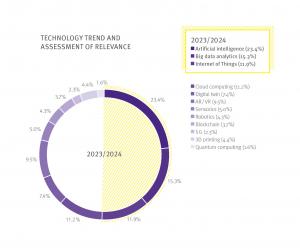Drees & Sommer's Trend Radar for Real Estate and Construction
AI, big data analytics, and the Internet of Things are among the top three in 2024
SINGAPORE, SINGAPORE, August 6, 2024 /EINPresswire.com/ -- Drees & Sommer2, a global consulting company providing a single source of consultation and implementation services for the real estate industry and infrastructure, has released its Innovation Scouting Report1 for 2024. This year, regarding technology trends and relevance, Trend Radar1 placed AI3 first with 23.4%, big data analytics second with 15.3%, and Internet of Things (IoT) third with 11.9%, followed closely by cloud computing and digital twin.
“We are running the Innovation Scouting Report for the fourth year in a row, and the forecasts from the previous year confirm the Trend Radar. AI, big data analytics, and IoT are again the leading trends in real estate and construction. However, it is important that these technologies are no longer considered separately. They work together and mutually strengthen each other. This interaction means that technological progress continues to accelerate,” comments Hanna Huber, Leader of Innovation Management at Drees & Sommer.
Synergies with AI will bring about a new boom. An example of this is a digital twin.
Developments in generative AI over the past year have led to a previously impossible level of interaction between the various technologies. Technologies such as the digital twin are losing importance when viewed in isolation but are gaining importance in synergy with AI.
Digital twin technology continues to have a strong global market value of USD 9.9 billion and is projected to reach an average growth rate of 33% in the period from 2024 to 2032. In addition to its conventional application as a generator of digital images of buildings and machines, the digital twin is also used in the production sector in combination with Omniverse, which is a real-time graphics collaboration platform developed by Nvidia. Growth is being driven by greater use in supply chain management and the increasing adoption of big data analytics, IoT, and cloud platforms. Combining these two technologies means accurate, reliable and optimized digital twins that offer even greater business benefits can be created. For example, Nvidia has constructed a digital twin of the Earth to enhance predictions of natural disasters and enable appropriate measures to be initiated promptly. The already significant importance of the digital twin is expected to be overshadowed by its integration with AI.
A new trend on the horizon: quantum computing
Drees & Sommer's Trend Radar shows that quantum computing is an emerging field of research that is currently attracting increased interest. Even though the technology is not yet considered to be of high relevance and is not yet widely used, quantum computing is seen as having significant potential. In 2022, the market value reached USD 1.9 trillion, which is expected to rise to USD 42.1 trillion by 2032. Quantum computing is more efficient than conventional computers at recognizing and analyzing complex patterns and relationships in large data sets. According to the Future Today Institute, quantum computing will have a significant impact within five years, particularly in the areas of cryptography, security, optimization and simulation, machine learning, and artificial intelligence.
AI: from a vision to a reality supported by the current boom in the AI startup scene
Within a very short time, artificial intelligence has developed from a vision into a reality. This field of research has developed rapidly since the Dartmouth Conference in the summer of 1956, when the term artificial intelligence (AI) was coined. AI has experienced a strong surge in recent years, especially due to generative AI (GenAI). Across the broad spectrum of AI applications, machine learning and deep learning focus on understanding complex concepts, recognizing patterns, and evaluating nuances of natural language.
The market for generative AI in the real estate industry is set to grow significantly. According to forecasts, the global market size is expected to increase to USD 102.78 billion by 2032, growing at a compound annual rate of 11.2%. Changes in the startup scene are also an important indicator of a range of developings. Startups employ new technologies, develop innovative business models and, therefore, drive digitalization. The current boom in the AI startup scene demonstrates this. According to the annual analysis by the appliedAI Institute for Europe, there were about 6,300 AI startups in Europe in 2023, about 10.6% of which are classified as generative AI startups. These are scattered across the EU, but the majority of AI startups are based in Germany. Globally, about one-quarter of all AI startups are in the USA.
Possible AI applications in the construction and real estate industry
AI has many potential applications in the construction and real estate industry, with numerous opportunities that can significantly influence and advance the sector. The two biggest challenges are getting people to adapt and the way in which companies deal with the changes that lie ahead.
One example is AI-assisted planning and optimization, where AI technologies contribute to intelligent space design, energy efficiency, and usage optimization. AI technologies can also be used for tasks such as site analysis, tender management, and the analysis and predictive modelling of building services equipment. Another important application is the use of generative design in BIM models. AI enables reliable and cost-efficient designs to be developed by exploring thousands of potential design variants for buildings.
According to this year’s PMRE Monitor – a market study of AI – increasing efficiency and quality by reducing process costs is one of the biggest application opportunities for AI, closely followed by increasing data quality through automated data creation and AI-assisted data collection and optimizing business processes through AI-based automation, vulnerability analysis and early warning systems. If one compares the various services provided by the construction and real estate industry, the PMRE Monitor currently sees the greatest AI potential in data and document management, and reporting. Accounting and building administration, valuation and finance, and strategic real estate management are also considered to be areas of great potential. Given the current high demand for monitoring of regulations, AI also offers a range of potential applications in ESG monitoring.
Sophia Silferkrok
Drees & Sommer
+65 8339 0020
email us here
Visit us on social media:
LinkedIn
WATCH NOW: The Blue Way, by Drees & Sommer. A film with a difference at https://www.youtube.com/watch?v=LfZVdiRWuc0

1 https://cdn.dreso.com/fileadmin/media/10_Landingpages/2024/Scouting_Bericht_2024/IC_Scouting_Bericht_2024_final_en.pdf?_gl=1*1qrwgko*_ga*MTI2ODkzMjE3My4xNzE3NjUwMDQ3*_ga_C30J1KVSGC*MTcxOTk5NjcxOS4xMy4xLjE3MTk5OTk1NjkuMC4wLjA.
2 http://www.dreso.sg
3 http://www.dreso.com/


